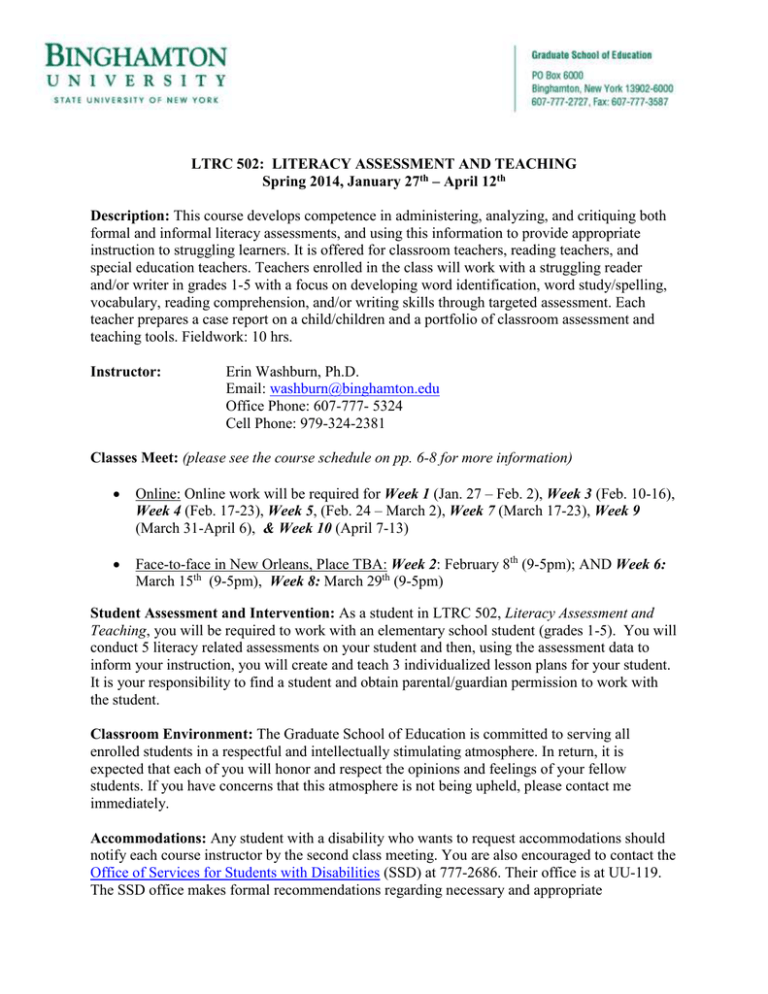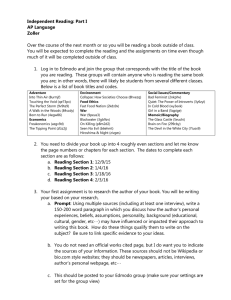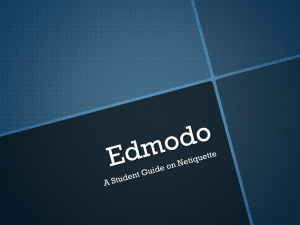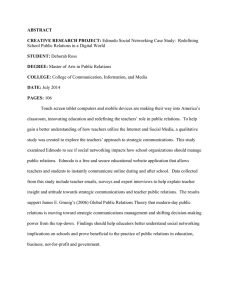LTRC 502
advertisement

LTRC 502: LITERACY ASSESSMENT AND TEACHING Spring 2014, January 27th – April 12th Description: This course develops competence in administering, analyzing, and critiquing both formal and informal literacy assessments, and using this information to provide appropriate instruction to struggling learners. It is offered for classroom teachers, reading teachers, and special education teachers. Teachers enrolled in the class will work with a struggling reader and/or writer in grades 1-5 with a focus on developing word identification, word study/spelling, vocabulary, reading comprehension, and/or writing skills through targeted assessment. Each teacher prepares a case report on a child/children and a portfolio of classroom assessment and teaching tools. Fieldwork: 10 hrs. Instructor: Erin Washburn, Ph.D. Email: washburn@binghamton.edu Office Phone: 607-777- 5324 Cell Phone: 979-324-2381 Classes Meet: (please see the course schedule on pp. 6-8 for more information) Online: Online work will be required for Week 1 (Jan. 27 – Feb. 2), Week 3 (Feb. 10-16), Week 4 (Feb. 17-23), Week 5, (Feb. 24 – March 2), Week 7 (March 17-23), Week 9 (March 31-April 6), & Week 10 (April 7-13) Face-to-face in New Orleans, Place TBA: Week 2: February 8th (9-5pm); AND Week 6: March 15th (9-5pm), Week 8: March 29th (9-5pm) Student Assessment and Intervention: As a student in LTRC 502, Literacy Assessment and Teaching, you will be required to work with an elementary school student (grades 1-5). You will conduct 5 literacy related assessments on your student and then, using the assessment data to inform your instruction, you will create and teach 3 individualized lesson plans for your student. It is your responsibility to find a student and obtain parental/guardian permission to work with the student. Classroom Environment: The Graduate School of Education is committed to serving all enrolled students in a respectful and intellectually stimulating atmosphere. In return, it is expected that each of you will honor and respect the opinions and feelings of your fellow students. If you have concerns that this atmosphere is not being upheld, please contact me immediately. Accommodations: Any student with a disability who wants to request accommodations should notify each course instructor by the second class meeting. You are also encouraged to contact the Office of Services for Students with Disabilities (SSD) at 777-2686. Their office is at UU-119. The SSD office makes formal recommendations regarding necessary and appropriate 2 accommodations based on an individual's specifically diagnosed disability. SSD, faculty, and staff are required to treat Information about a student's disability as confidential. Writing Support: If you have difficulty communicating your thoughts in writing, please make a point of using the campus Writing Center before your first paper is due. (If your letter of acceptance advised you to get support from the Writing Center, this is required.) Writing support is most effective if you make appointments with the same tutor throughout the semester. Please go to: http://www2.binghamton.edu/writing/writing-center/wc-faq.html Academic Honesty: Binghamton University provides explicit guidelines in the Student Academic Honesty Code (see the University Bulletin - Academic Policies and Procedures for All Students). Unless specified otherwise in the syllabus, I expect the work you submit for grading to be yours and yours alone. Not acknowledging another's work with proper references, taking credit for someone else's work, letting your work appear in another student's paper, or fabricating "results" are grounds for failing the assignment and/or the course. The Academic Honesty Code specifically prohibits "Submitting substantial portions of the same work for credit more than once, unless there is prior explicit consent of the instructor(s) to whom the material is being or has been submitted." If you have any questions about what constitutes plagiarism or cheating, please ask me. The following link describes the GSE Academic Honesty Policy: http://www2.binghamton.edu/grad-school/manual/index.html#Academic_Honesty Student Grievances: The Graduate School of Education outlines procedures if you have a grievance about a course grade. The first step is to contact the instructor to discuss your concerns. If you have any questions or concerns about how I have graded your work, please arrange to meet with me. Edomodo & Technology: Course handouts, power points, and links to videos are posted on Edmodo for downloading & printing. REQUIRED TEXTS Cooter, R.B., Flynt, E.S, & Cooter, K.S. (2007). Comprehensive reading inventory: Measuring reading development in regular and special education classrooms. Upper Saddle River, NJ: Pearson. Bear, D. R., Invernizzi, M., Templeton, S., & Johnston, F. (2012). Words their way, 5th ed. Boston: Pearson. Various articles available on Edmodo RECOMMENDED TEXTS Vadasy, P. F., & O’Connor, R. E. (2011). Handbook of reading interventions. New York: Guildford Press. Caldwell, J. S., & Leslie, L. (2013). Intervention strategies to follow informal reading inventory assessment (3rd ed.). Boston: Pearson. 3 SELECTED WEB RESOURCES www.readwritethink.org (K-6 standards-based, peer-reviewed lesson plans, etc.) www.reading.org/ (the International Reading Association) http://www.nysreading.org/ (the New York State Reading Association) http://www.cec.sped.org (Council for Exceptional Children) http://fcrr.org (Florida Center for Reading Research) http://readingrockets.org (Reading Rockets) COURSE GOALS Understand current theories of literacy assessment and instruction. Develop competence in administering, analyzing, and critiquing formal and informal literacy assessments. Understand testing vocabulary and the strengths and limitations of various assessment instruments, and be able to interpret them for parents and others. Use assessment data to provide appropriate literacy instruction to struggling learners based on their interests, strengths, and needs. Document and maintain a careful record of assessment and instruction. Prepare a professional case study report on tutored student. Your Goals – take some time to read through the course goals. After considering both the course goals and your own professional needs, what knowledge would you like to gain in this course? What are some skills you would like to gain in this course? 1. 2. 3. 4 COURSE REQUIREMENTS Online Work (postings, videos, Google Chats, etc.) Administration & Analysis of Assessments/Assessment Reports Case Study Report Lesson Plans (3) TOTAL 40 pts. 30 pts. 15 pts. 15 pts. 100 pts. COURSE GRADING Grading Scale: 95-100 90-94 86-89 83-85 80-82 76-79 73-76 70-72 70 A AB+ B BC+ C CF Late Work: To remain fair to all individuals enrolled and involved in the class there will be points taken off for late work. No late work will be accepted after 2 weeks. 2 points will be taken off for work turned in after due date (up to one week late) 4 points will be taken off for work turned in after one week late ASSIGNMENTS Online Work: (40 points) Which could include one or more the following (week dependent): Online postings Google chats Viewing online videos Online Postings: For online sessions in which a posting is required (see the course schedule on pp. 6-8 for exact dates) you will need to post a thoughtful response to Dr. Washburn’s online question(s) as well as respond to at least one of your classmates’ responses. Your response to Dr. Washburn’s question must be posted by FRIDAY at 11:59pm and your response(s) to one of your classmates must be made by SUNDAY at 11:59pm. All postings will be done on Edmodo. 5 Administration and Analysis of Assessments (30 points): You will conduct 5 literacy related assessments with an elementary student (grades 1-5). After administering the assessments, you are required to analyze the results. You will then summarize the results/analysis using the Assessment Report Handouts (on Edmodo). There will be 3 assessment reports (10 points each). Assessments 1. Interest Inventory 2. ERAS and /or RSPS 1. Qualitative Spelling Inventory 2. Writing sample CRI Assessment Report REPORT #1: Affective Measures REPORT #2: Written Expression & Spelling/Orthography REPORT #3: Reading Report Due By 11:59pm on 3/15 on Edmodo By 11:59pm on 3/15 on Edmodo By 11:59pm on 3/23 on Edmodo Lesson Plans (15 points): After assessment, you will create and deliver three instructional lesson plans for your student. Please use the BU Literacy Education Lesson Plan template (on Edmodo) to create your lessons. For each lesson you will include instruction that will support your findings. Therefore, lesson plans are clearly case dependent. However, possible areas for instruction may include: Alphabetics/Phonics – word level instruction that supports strategic decoding and fluency. Word study, vocabulary instruction– word study instruction is often best when it is connected to what the child is reading at his/her independent or instructional level. Fluency – repeated readings of a text on the student’s independent reading level (e.g., once for accuracy, once for expression, once for comprehension), recorded repeated readings, reader’s theater, etc… Reading comprehension- Together, choose a book (or books) that is interesting and is on either the student’s independent or instructional reading level. Use this book to engage in partner/shared reading, modeling, practicing metacognitive strategies, decoding strategies, and Q/A conversations to improve child’s comprehension (interpretation, synthesis and critical thinking). Writing - story writing, non-fiction writing (e.g., writing a how-to book), an authentic writing task (letter to a family member, friend, etc.) The following resources may be helpful in finding activities/strategies for your lessons: Florida Center for Reading Research Student Center Activities Database: http://www.fcrr.org/curriculum/SCAindex.shtm Reading Rockets: http://www.readingrockets.org/atoz/ Words Their Way text (Bear et al., 2011) 6 Case Study Report (15 points): You will prepare a case study report for your student in which you provide a detailed explanation of the following: (a) all assessments administered, (b) the results and analysis of each assessment, (c) tutoring goals, (d) techniques / strategies used in tutoring (aligned with student goals), and (e) student progress for each goal. The first three sections (a-c above) will be completed through the three assessment reports. In other words, we will be working on the case study reports throughout the course. More detailed instructions, along with samples, will be will be provided in class. You will also be required to communicate assessment results and student’s response to your instruction (lesson plans) to both parents/guardians and at least one other teacher who works with your student. Class Schedule (As with all things in life and in education – this is subject to change) Session 1 & Date Week 1 – Online (1/27-2/2) Topics Reading Theory: Stages & Development Readings to be read PRIOR for “Online Work” (for Online weeks) of for In Class Discussion (for Face-to-Face weeks) McKenna & Stahl (2008) Assignments Due Find a Student(s) to Assess and Tutor Lipson et al. (2012) Online Work on Edmodo Principles for and types of Literacy Assessment Week 2– Face-toFace (2/8) (9am12pm) Assessing the Affective Domain Why? McKenna, Kear & Ellsworth (1995) With what? (1) Interest Inventory (a link to sample Interest Inventories can be found on Edmodo) (2) Elementary Reading Attitude Survey (ERAS): ERAS is uploaded on Edmodo from McKenna & Kear (1990) (3) Reader Self-Perception Scale (RSPS): RSPS is uploaded on Edmodo from Henk & Melnick (1995) 7 Week 2 – Face-toFace (2/8) (1pm5pm) Week 3 – Online Assessing Reading Why? Nilsson (2008) Discuss Assessment Report Expectations and Case Study With what? Comprehensive Reading Inventory – read pp. 16-35 Assessing Spelling Why? Bear, Invernizzi, Templeton, & Johnston (2012) - Words Their Way – Ch. 1 (2/102/16) Online Work on Edmodo With what? The Primary or Elementary Spelling Inventory: Primary and Elementary Spelling Inventories can be found in Bear, Invernizzi, Templeton, & Johnston (2012) Words Their Way – Ch. 2 Week 4 – Online Assessing Writing (2/172/23) Why? Graham, Harris & Hebert (2011), read pp. 9-30 Online Work on Edmodo With what? Writing Sample – Scoring Guide from 6+1 Traits for writing assessment is on Edmodo 6+1 Traits and CCSS Crosswalk (on Edmodo) Week 5 Online Complete Assessments with Student(s) (2/24-3/2) No Class (3/3-3/9) Mardi Gras! No Readings Complete all assessments with student(s) Turn in CRI Student Summary Form (pp.379-382 in the CRI text) on Edmodo (by 11:59pm on 3/2) 8 Week 6 – Face-toface (3/15) (9am12pm) Week 6 – Face-toface Assessment Informs Instruction – Overview Valencia & Buly (2004) Schunk (2003) Discuss Lesson Plan Expectations Please bring all student assessment data Assessment Informs Instruction– Word Level Intervention Turn in Assessment Reports 1 & 2 on Edmodo (by 11:59pm on 3/15) Observations at schools on Monday, 3/17 Word Identification – SpearSwerling (2011) Fluency – Hudson (2011) (3/15) (1pm5pm) Week 7 – Online Assessment Informs Instruction Comprehension Intervention Comprehension – Klinger, Morrison & Eppolito (2011) and Williams & Pao (2011) Online Work on Edmodo Assessment Informs Instruction – Spelling/word study/vocabulary Instruction and Intervention Spelling/word Study/vocabulary - Bear, Invernizzi, Templeton, & Johnston (2012) - Words Their Way – Ch. 3; 4-8 (choose a chapter dependent upon your student’s development stage) (on Edmodo) Begin with student: Lessons 1-3 Week 9 Online (3/314/6) Assessment Informs Instruction – Writing Instruction and Intervention Writing – Zumbrunn & Krause (2012) and Mo, Kopke, Hawkins, Troia & Olinghouse (2013) Finish lessons (if need-be) Week 10 Online Communicating a Case Study Meet with Parents/ Case Study Due by Guardians and other Teacher(s) April 13th at 11:59pm on to Discuss Student Case Study – Edmodo it is up to your discretion as to when you meet with your student’s parents/ Guardians and teacher(s) (3/173/23) Week 8 – Face-toface (3/29) (9am5pm) (4/74/12) Turn in Assessment Report 3 on Edmodo (by 11:59pm on 3/23) Observation at schools on Monday, 3/31


